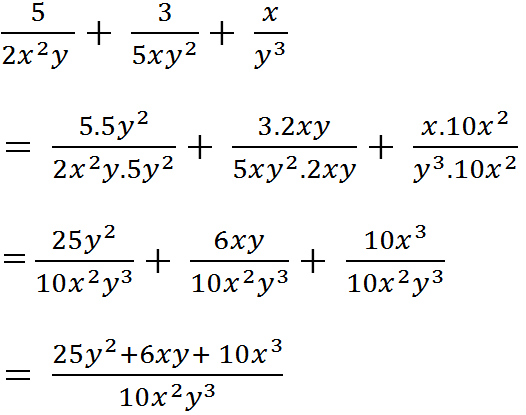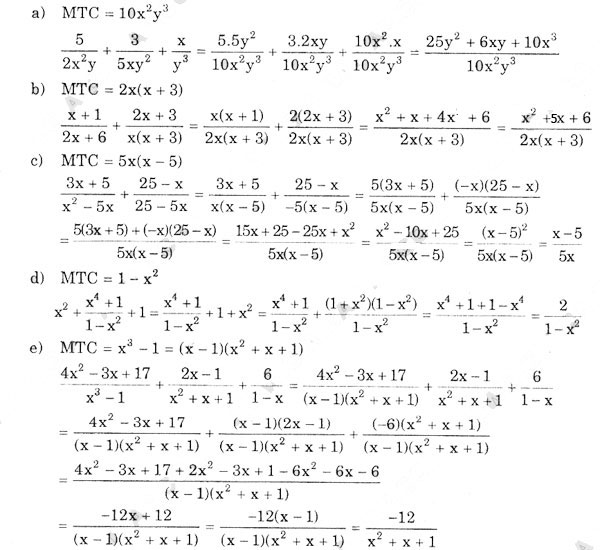Hãy nhập câu hỏi của bạn vào đây, nếu là tài khoản VIP, bạn sẽ được ưu tiên trả lời.

a: \(\Leftrightarrow5\left(x+1\right)\left(x-1\right)=2x-2-3x-3=-x-5\)
\(\Leftrightarrow5x^2-5+x+5=0\)
=>x(5x+1)=0
=>x=0 hoặc x=-1/5
b: \(\Leftrightarrow x^2-x-\left(2x-3\right)\left(x+1\right)=2x+3\)
\(\Leftrightarrow x^2-x-2x^2-2x+3x+3=2x+3\)
\(\Leftrightarrow-x^2+3=2x+3\)
=>-x(x+2)=0
=>x=0(nhận) hoặc x=-2(nhận)
c: \(\Leftrightarrow4x^2-25=0\)
=>(2x-5)(2x+5)=0
=>x=5/2 hoặc x=-5/2

Hằng đẳng thức mà tương ạ! :v
a, \(\dfrac{8x^3-\dfrac{1}{125}y^3}{4x^2+\dfrac{1}{25}y^2+\dfrac{2}{5}xy}\)
\(=\dfrac{\left(2x-\dfrac{1}{5}y\right)\left(4x^2+\dfrac{2}{5}xy+\dfrac{1}{25}y^2\right)}{4x^2+\dfrac{1}{25}y^2+\dfrac{2}{5}xy}=2x-\dfrac{1}{5}y\)
b, \(\dfrac{x^3-6x^2+2x+15}{x-5}\)
\(=\dfrac{x^3-5x^2-x^2+5x-3x+15}{x-5}\)
\(=\dfrac{x^2\left(x-5\right)-x\left(x-5\right)-3\left(x-5\right)}{x-5}\)
\(=\dfrac{\left(x-5\right)\left(x^2-x-3\right)}{\left(x-5\right)}=x^2-x-3\)
Rồi ạ :v!

a)
2x-3=0 => x=3/2
b)
2x^2 +1 =0 => vô nghiệm
c) x^2 -25 =0 => x=5 loiaj
x=-5 nhân
d)
x^2 -25 =0 => x=5 loại
x=-5 loại

Bài 2 .
a) \(\dfrac{2x}{x^2+2xy}+\dfrac{y}{xy-2y^2}+\dfrac{4}{x^2-4y^2}\)
\(=\dfrac{2x}{x\left(x+2y\right)}+\dfrac{y}{y\left(x-2y\right)}+\dfrac{4}{\left(x-2y\right)\left(x+2y\right)}\)
\(=\dfrac{2xy\left(x-2y\right)+xy\left(x+2y\right)+4xy}{xy\left(x+2y\right)\left(x-2y\right)}\)
\(=\dfrac{2x^2y-2xy^2+x^2y+2xy^2+4xy}{xy\left(x+2y\right)\left(x-2y\right)}\)
\(=\dfrac{3x^2y+4xy}{xy\left(x+2y\right)\left(x-2y\right)}\)
b) Sai đề hay sao ý
c) \(\dfrac{2x+y}{2x^2-xy}+\dfrac{16x}{y^2-4x^2}+\dfrac{2x-y}{2x^2+xy}\)
\(=\dfrac{2x+y}{x\left(2x-y\right)}+\dfrac{-16x}{\left(2x-y\right)\left(2x+y\right)}+\dfrac{2x-y}{x\left(2x+y\right)}\)
\(=\dfrac{\left(2x+y\right)^2-16x^2+\left(2x-y\right)^2}{x\left(2x-y\right)\left(2x+y\right)}\)
\(=\dfrac{4x^2+4xy+y^2-16x^2+4x^2-4xy+y^2}{x\left(2x-y\right)\left(2x+y\right)}\)
\(=\dfrac{-8x^2}{x\left(2x-y\right)\left(2x+y\right)}\)
d) \(\dfrac{1}{1-x}+\dfrac{1}{1+x}+\dfrac{2}{1+x^2}+\dfrac{4}{1+x^4}+\dfrac{8}{1+x^8}+\dfrac{16}{1+x^{16}}\)
\(=\dfrac{2}{1-x^2}+\dfrac{2}{1+x^2}+\dfrac{4}{1+x^4}+\dfrac{8}{1+x^8}+\dfrac{16}{1+x^{16}}\)
\(=\dfrac{4}{1-x^4}+\dfrac{4}{1+x^4}+\dfrac{8}{1+x^8}+\dfrac{16}{1+x^{16}}\)
.....
\(=\dfrac{16}{1-x^{16}}+\dfrac{16}{1+x^{16}}\)
\(=\dfrac{32}{1-x^{32}}\)

\(\dfrac{x}{x-1}-\dfrac{2x}{x^2-1}=0\left(ĐKXĐ:x\ne\pm1\right)\\ \Leftrightarrow\dfrac{x\left(x+1\right)}{\left(x-1\right)\left(x+1\right)}-\dfrac{2x}{\left(x-1\right)\left(x+1\right)}=0\\ \Rightarrow x^2+x-2x=0\\ \Leftrightarrow x^2-x=0\Leftrightarrow x\left(x-1\right)=0\\ \Rightarrow\left[{}\begin{matrix}x=0\\x-1=0\Rightarrow x=1\left(loại\right)\end{matrix}\right.\)
vậy phương trình có tập nghiệm là S={0}.
b)
\(\dfrac{\left(x+2\right)^2}{2x-3}-1=\dfrac{x^2+10}{2x-3}\left(ĐKXĐ:x\ne\dfrac{3}{2}\right)\)
quy đồng và khử mẫu phương trình trên, ta được:
\(\left(x+2\right)^2+3-2x=x^2+10\\ \Leftrightarrow x^2+4x+4-2x-x^2=10-3\)
\(\Leftrightarrow2x+4=7\Leftrightarrow2x=7-4=3\Rightarrow x=\dfrac{3}{2}\left(loại\right)\)
vậy phương trình đã cho vô nghiệm.
c)\(\dfrac{x+5}{x-5}-\dfrac{x-5}{x+5}=\dfrac{20}{x^2-25}\left(ĐKXĐ:x\ne\pm5\right)\)
\(\Leftrightarrow\dfrac{\left(x+5\right)^2}{\left(x-5\right)\left(x+5\right)}-\dfrac{\left(x-5\right)^2}{\left(x+5\right)\left(x-5\right)}=\dfrac{20}{\left(x+5\right)\left(x-5\right)}\)
\(\Rightarrow\left(x+5\right)^2-\left(x-5\right)^2=20\)
\(\Leftrightarrow x^2+25x+25-x^2+25x-25=20\\ \Leftrightarrow50x=20\Rightarrow x=\dfrac{2}{5}\)
vậy tập nghiệm của phương trình là \(S=\left\{\dfrac{2}{5}\right\}\)
d)\(\dfrac{3x+2}{3x-2}-\dfrac{6}{2+3x}=\dfrac{9x^2}{9x^2-4}\left(ĐKXĐ:x\ne\pm\dfrac{2}{3}\right)\)
quy đồng và khử mẫu phương trình trên, ta được:
\(\left(3x+2\right)^2-6\left(3x-2\right)=9x^2\\ \Leftrightarrow9x^2+12x+4-18x+12-9x^2=0\\ \Leftrightarrow16-6x=0\Leftrightarrow6x=16\Rightarrow x=\dfrac{16}{6}\)
vậy tập nghiệm của phương trình là \(S=\left\{\dfrac{16}{6}\right\}\)
e)\(\dfrac{3}{5x-1}+\dfrac{2}{3-5x}=\dfrac{4}{\left(1-5x\right)\left(5x-3\right)}\left(ĐKXĐ:x\ne\dfrac{1}{5};\dfrac{3}{5}\right)\)
quy đồng và khử mẫu phương trình trên, ta được:
\(3\left(3-5x\right)+2\left(5x-1\right)=4\\ \Leftrightarrow9-15x+10x-2=4\\ \Leftrightarrow-5x=-3\Rightarrow x=\dfrac{3}{5}\left(loại\right)\)
vậy phương trình đã cho vô nghiệm.
f)
\(\dfrac{3}{1-4x}=\dfrac{2}{4x+1}-\dfrac{8+6x}{16x^2-1}\left(ĐKXĐ:x\ne\pm\dfrac{1}{4}\right)\)
quy đồng và khử mẫu phương trình trên, ta được:
\(-3\left(4x+1\right)=2\left(4x-1\right)-8-6x\\ \Leftrightarrow-12x-3=8x-2-8-6x\\ \Leftrightarrow-14x=-7\Rightarrow x=\dfrac{1}{2}\)
vậy phương trình có tập nghiệm là \(S=\left\{\dfrac{1}{2}\right\}\)
g)
\(\dfrac{y-1}{y-2}-\dfrac{5}{y+2}=\dfrac{12}{y^2-4}+1\left(ĐKXĐ:y\ne\pm2\right)\)
quy đồng và khử mẫu phương trình trên, ta được:
\(\left(y-1\right)\left(y+2\right)-5\left(y-2\right)=12+y^2-4\\ \Leftrightarrow y^2+y-2-5y+10=12+y^2-4\\ \Leftrightarrow-4y+8=8\Leftrightarrow-4y=0\Rightarrow y=0\)
vậy phương trình có tập nghiệm là S={0}
h)
\(\dfrac{x+1}{x-1}-\dfrac{x-1}{x+1}=\dfrac{4}{x^2-1}\left(ĐKXĐ:x\ne\pm1\right)\)
quy đồng và khử mẫu phương trình trên, ta được:
\(\left(x+1\right)^2-\left(x-1\right)^2=4\\ \Leftrightarrow x^2+2x+1-x^2+2x-1=4\\ \Leftrightarrow4x=4\Rightarrow x=1\)
vậy phương trình có tập nghiệm là S={1}.
i)
\(\dfrac{2x-3}{x+2}-\dfrac{x+2}{x-2}=\dfrac{2}{x^2-4}\left(ĐKXĐ:x\ne\pm2\right)\)
quy đồng và khử mẫu phương trình trên, ta được:
\(\left(2x-3\right)\left(x-2\right)-\left(x+2\right)=2\\ \Leftrightarrow2x^2-7x+6-x^2-4x-4=2\\ \Leftrightarrow x^2-11x=0\Rightarrow\left[{}\begin{matrix}x=0\\x-11=0\Rightarrow x=11\end{matrix}\right.\)
vậy phương trình có tập nghiệm là S={0;11}
j)
\(\dfrac{x-1}{x^2-4}=\dfrac{3}{2-x}\left(ĐKXĐ:x\ne\pm2\right)\)
quy đồng và khử mẫu phương trình trên, ta được:
\(x-1=-3\left(x+2\right)\Leftrightarrow x-1=-3x-6\\ \Leftrightarrow4x=5\Rightarrow x=\dfrac{5}{4}\)
vậy phương trình có tập nghiệm là \(S=\left\{\dfrac{5}{4}\right\}\)

Bài 1:
a) \(\dfrac{3x^2-5}{x^2-5x}+\dfrac{5-15x}{5x-25}\)
\(=\dfrac{3x^2-5}{x\left(x-5\right)}+\dfrac{5\left(1-3x\right)}{5\left(x-5\right)}\)
\(=\dfrac{3x^2-5}{x\left(x-5\right)}+\dfrac{1-3x}{x-5}\)
\(=\dfrac{3x^2-5}{x\left(x-5\right)}+\dfrac{x\left(1-3x\right)}{x\left(x-5\right)}\)
\(=\dfrac{3x^2-5+x\left(1-3x\right)}{x\left(x-5\right)}\)
\(=\dfrac{3x^2-5+x-3x^2}{x\left(x-5\right)}\)
\(=\dfrac{-5+x}{x\left(x-5\right)}\)
\(=\dfrac{x-5}{x\left(x-5\right)}\)
\(=\dfrac{1}{x}\)
b) \(\dfrac{4+x^3}{x-3}-\dfrac{2x+2x^2}{x-3}+\dfrac{2x-13}{x-3}\)
\(=\dfrac{\left(4+x^3\right)-\left(2x+2x^2\right)+\left(2x-13\right)}{x-3}\)
\(=\dfrac{4+x^3-2x-2x^2+2x-13}{x-3}\)
\(=\dfrac{x^3-2x^2-9}{x-3}\)
\(=\dfrac{x^3-3x^2+x^2-9}{x-3}\)
\(=\dfrac{x^2\left(x-3\right)+\left(x-3\right)\left(x+3\right)}{x-3}\)
\(=\dfrac{\left(x-3\right)\left(x^2+x+3\right)}{x-3}\)
\(=x^2+x+3\)
c) \(\dfrac{2}{x-5}+\dfrac{x-25}{\left(x+5\right)\left(x-5\right)}\)
\(=\dfrac{2\left(x+5\right)}{\left(x+5\right)\left(x-5\right)}+\dfrac{x-25}{\left(x+5\right)\left(x-5\right)}\)
\(=\dfrac{2\left(x+5\right)+x-25}{\left(x+5\right)\left(x-5\right)}\)
\(=\dfrac{2x+10+x-25}{\left(x+5\right)\left(x-5\right)}\)
\(=\dfrac{3x-15}{\left(x+5\right)\left(x-5\right)}\)
\(=\dfrac{3\left(x-5\right)}{\left(x+5\right)\left(x-5\right)}\)
\(=\dfrac{3}{x+5}\)
d) Đề sai?
Bài 2:
\(A=2\left(x+1\right)+\left(3x+2\right)\left(3x-2\right)-9x^2\)
\(A=2x+2+9x^2-4-9x^2\)
\(A=2x-2\)
\(A=2\left(x-1\right)\)
Thay x = 15 vào A ta được:
\(A=2\left(15-1\right)\)
\(A=2.14=28\)

a)
\(\left\{{}\begin{matrix}x-1\ne0\\x+2\ne0\end{matrix}\right.\)
b)
x khác 1
c)
x khác 0; x khác 5
d) x khác 5 ; x khác -5

1) \(4x^2+4x+1=\left(2x+1\right)^2\)
2)\(9x^2-24xy+16y^2=\left(3x-4y\right)^2\)
3)\(-x^2+10x-25=-\left(x-5\right)^2\)
4)\(1+12x+36x^2=\left(1+6x\right)^2\)
5) \(\dfrac{x^2}{4}+2xy+4y^2=\left(\dfrac{x}{2}+2y\right)^2\)
6) \(4x^2+4xy+y^2=\left(2x+y\right)^2\)












Ta có: \(\dfrac{-4x^2}{x^2-25}-\dfrac{2x^2+x}{x^2-25}-\dfrac{2x}{5-x}\)
\(=\dfrac{-4x^2-2x^2-x}{\left(x-5\right)\left(x+5\right)}+\dfrac{2x}{x-5}\)
\(=\dfrac{-6x^2-x}{\left(x-5\right)\left(x+5\right)}+\dfrac{2x\left(x+5\right)}{\left(x-5\right)\left(x+5\right)}\)
\(=\dfrac{-6x^2-x+2x^2+10x}{\left(x-5\right)\left(x+5\right)}\)
\(=\dfrac{-4x^2+9x}{\left(x-5\right)\left(x+5\right)}\)